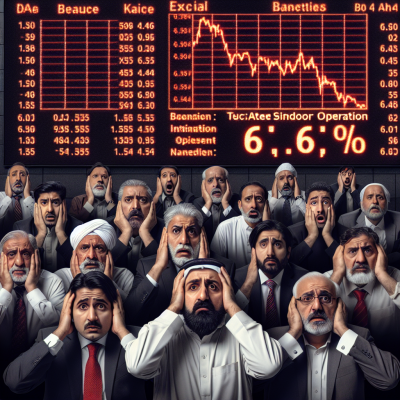
Pakistan’s Stock Market Reels Amid Rising Tensions with India
The geopolitical landscape between India and Pakistan intensified after a dramatic military escalation, leading to a sharp downturn in investor confidence across the Pakistani financial markets. On the heels of India’s retaliatory strikes, the Pakistan Stock Exchange (PSX) experienced a steep 6% plunge at opening, underscoring market vulnerability in the face of geopolitical crises.
India’s Response to April 22 Attack Sparks Market Jitters
On April 22, a deadly attack in Indian-administered Kashmir resulted in the loss of 26 lives. In a swift and pointed response, India launched strikes targeting what it claims were terrorist infrastructure across the border. Citing Islamabad’s alleged complicity, Indian officials clarified that the operation was a direct consequence of the Kashmir incident.
Pakistan, however, has firmly denied any involvement in the attack and has issued stern warnings, stating it would retaliate if subjected to further aggression. This rhetoric has ignited apprehension among investors, deeply influencing the behavior of capital markets.
Market Fallout: PSX Witnesses Heavy Sell-Off
At the opening bell, the benchmark KSE-100 index of the Pakistan Stock Exchange dropped by over 2,800 points—approximately 6%, as traders scrambled to offload equities amidst fears of an escalating conflict. This sharp decline marked one of the most volatile trading sessions in recent memory.
Key Factors Driving the Market Dip
- Geopolitical uncertainty: Investors are reacting to the uncertainty surrounding potential retaliatory actions and their implications for regional stability.
- Heightened risk perception: The possibility of a prolonged standoff or even conflict has significantly elevated perceived investment risk in Pakistan.
- Capital flight: Foreign investors initiated withdrawals from sensitive sectors, especially financials and energy stocks, accelerating the benchmark index’s fall.
Regional and Global Implications
The economic repercussions of India’s counter-strike and the downward spiral of Pakistan’s markets may ripple well beyond their borders. With both nations being nuclear powers, any intensification raises alarms in financial centers worldwide.
Global Market Watchdogs Closely Monitoring the Situation
International financial institutions, including the World Bank and the IMF, are purportedly monitoring the situation closely. Prolonged instability between two major South Asian economies could impair regional trade flows and investor sentiment in adjacent emerging markets.
Currency and Commodities Under Pressure
Along with the stock exchange, the Pakistani Rupee also faced depreciation pressures as safe-haven demand surged globally. Commodities, particularly gold and crude oil, saw minor volatility as investors braced for possible supply disruptions or policy shifts in the aftermath of further military action.
Pakistan Government’s Response Aims to Stabilize Markets
Amid market chaos, local monetary and political authorities in Islamabad are working to restore investor confidence. The Securities and Exchange Commission of Pakistan (SECP) issued temporary measures to curb extreme market movements, including restrictions on speculative trading.
Additionally, the Ministry of Finance released a statement urging calm and affirming that steps are underway to ensure market liquidity and macroeconomic stability.
Prime Minister’s Office Reacts
While the government condemned India’s strikes, it emphasized that Pakistan’s military and diplomatic responses would be “measured yet firm.” The government’s mixed tone of caution and readiness reflects the balancing act between preserving national dignity and avoiding extensive macroeconomic fallout.
Historical Echoes: Not the First Market Reaction to Conflict
This is not the first time markets have reacted sharply to India-Pakistan tensions. Past cross-border confrontations, such as the 2016 Uri attack and the 2019 Balakot airstrike, triggered similar investor anxieties and significant short-term equity losses. Historically, while markets tend to recover, the duration and extent of recovery hinge upon diplomatic efforts and mitigating war rhetoric.
Looking Ahead: What Investors Can Expect
As developments unfold, investors should stay attuned to both regional signals and global policy responses. Portfolio managers are likely to reassess exposure to South Asia, especially in sectors vulnerable to political risk.
Expert Insight: Diversification Is Key
Financial analysts advise maintaining diversification to offset emerging market volatility. While the immediate outlook remains uncertain, long-term investors may find opportunities as valuations dip and markets eventually stabilize.
Conclusion: Volatility as a Symptom of Broader Anxiety
The 6% crash of Pakistan’s benchmark share index signals more than just market dynamics; it reflects widespread anxiety about a potential military escalation. As India and Pakistan navigate this delicate moment in their bilateral relations, the financial world watches closely—hoping for diplomacy but bracing for further shocks.
Until a clearer resolution is on the horizon, the market will remain volatile, underscoring the inseparable link between politics and economics in emerging regions.


Leave a Reply